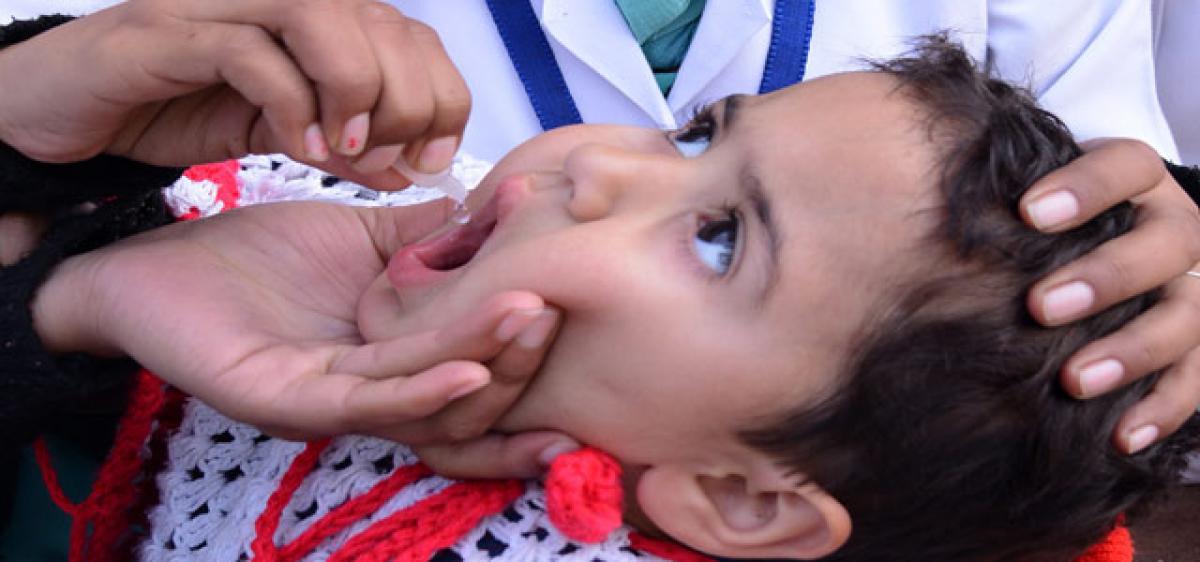Live
- Toyota Kirloskar Motor Celebrates 1 Lakh Urban Cruiser Hyryder on Indian Road
- MLS: New York City FC part ways with head coach Nick Cushing
- Delhi CM says Centre cutting AAP voters’ names from rolls, BJP hits back
- Hyderabad Metro Rail Phase-II Works to Begin in Old City in January 2025
- Odisha: 668 persons killed in human-elephant conflicts in last three years
- DEFENDER JOURNEYS: TO EMBARK ON ITS THIRD EDITION FROM NOVEMBER 2024
- Participating in Prakriti Parikshan can help build a healthier India: Prataprao Jadhav
- ISRO's Shukrayaan-1 Mission Approved: India’s First Venus Orbiter to Launch in 2028
- Pawan Kalyan urges centre for Railway Infrastructure Development in Pithapuram
- Inorbit Mall Cyberabad Hosts ‘The Science Playground’ – A Fun-filled Science Fest for Kids!
Just In
Understanding effective health intervention in children


Immunisation is one of the most effective health interventions for protection of children, especially under five years of age, from life threatening conditions which are preventable.
Immunisation is one of the most effective health interventions for protection of children, especially under five years of age, from life threatening conditions which are preventable.
Because of advances in vaccines, children can be protected against more life threatening diseases than ever before.
Some diseases that once caused serious health problems or killed thousands of children, have been eliminated completely and others are close to extinction– primarily due to safe and effective vaccines.
One example of the great impact that vaccines can have is the elimination of polio in India. India has been declared polio free in January 2014.
The government in its national immunisation schedule includes vaccines that provide immunity against the following diseases – polio (OPV and IPV), tuberculosis (BCG), diphtheria, pertussis/whooping cough, tetanus (DPT), hemophilus influenzae, hepatitis b, measles, mumps, rubella (MMR) and typhoid vaccine. Japanese encephalitis vaccine is included in the schedule in few places.
Besides these there are many diseases which have significant disease burden in India. These diseases are severe in nature and can even cause death.
The Indian Academy of Paediatrics after reviewing the disease burden and the vaccines effectiveness also strongly recommends the following vaccines – rotavirus vaccine, pneumococcal vaccine, hepatitis a vaccine and chicken pox vaccine.
A few vaccines like flu vaccine and meningococcal vaccine may be given if the parents and the paediatrician feel the need to do so.
Lets bust some myths
Vaccines suppress the natural immune system of children – FALSE
Vaccines whether a single vaccine or multiple vaccines given together do not affect the ability of the child’s immune system to produce antibodies against other diseases.
Vaccines especially MMR can cause autism – FALSE
There have been several studies which prove without any doubt that there is no link between vaccines and autism. MMR vaccine does not cause autism.
There is no harm in delaying vaccination – FALSE
Most of the vaccine preventable diseases are more severe in younger children especially infants. If there is delay in giving these vaccines then the child is essentially unprotected against these diseases. So it is important to give the vaccines on time as recommended.
There is no need to give repeated doses of the same vaccine – FALSE
Many vaccines require multiple or booster doses to provide adequate immunity against the disease.
India has been declared polio free – FALSE
Even though no new polio cases have been detected, polio virus has been isolated from sewer samples in a few places. Also our neighbouring countries are still not polio free so the risk of polio is still there and hence the need of polio immunisation.
Vaccines by government are the only ones important – FALSE
For the government of India to incorporate any vaccine in the national immunisation schedule there are financial and logistic factors that have to be taken into consideration. The additional vaccines recommended by the Indian Academy of Paediatrics and by most paediatricians also provide protection against severe and potentially life threatening diseases. In fact most of these additional vaccines are part of national immunisation schedule in many countries.
By: Dr Preeti Sharma
The writer is Consultant Paediatrician, KIMS Cuddles, Kondapur, Hyderabad.

© 2024 Hyderabad Media House Limited/The Hans India. All rights reserved. Powered by hocalwire.com






